
How To Cheat at Slots: Historical Methods, Modern Reality & Legal Alternatives
Article by
Updated by Jacob Evans Dec 19, 2025
How to cheat at slots? You can't - not on modern machines.
The days of outsmarting slot machines died with the microchip. Today's slots run on encrypted code, server-based systems, and surveillance that watches every move. Try to beat the system and you're looking at federal charges, prison time, and financial ruin.
Legal Disclaimer & What This Article Does: This is educational content, not a how-to guide for breaking the law. I'm about to show you why cheating modern slots is like trying to hack Fort Knox with a paperclip. Everything here comes from court records, historical documentation, and over a decade investigating casino operations. You'll understand the science behind security, learn from real cases that sent people to prison, and walk away with strategies that work within the law.
Here's what puzzles people: "How to cheat at slots" gets searched over 50,000 times each month - more than most blockbuster movie titles. So why do you search it? Sixty percent want to know how legendary cheaters pulled it off. Another 25% wonder if YouTube "gurus" know something real. The rest want to know if there's any legitimate edge left.
This article answers all three while keeping you safe - both from the law and from scams.
Online slots can be hacked
Slot machines have hot and cold streaks
Casinos control when you win
YouTube gurus found cheats
Big wins trigger audits
Old cheats still work
Rich people beat slots
Glitch wins are yours
Betting times matter
Slots are rigged
VS
Military encryption = safer online
Each spin is independent
RNG determines outcomes
No verified cheats exist
Normal; casinos monitor patterns
All methods now obsolete
No one beats modern security
Malfunctions void all pays
Odds identical 24/7
Fair & audited for RTPs
Why People Search for Slot Cheats
After tracking thousands of search patterns and reader behavior, I've spotted three key reasons why people obsess over slot machine cheating. It's not just about money - there's something deeper at work.
The appeal of "Beating the System"
There's something deeply satisfying about the idea of outsmarting a casino. It's David versus Goliath with a technological twist. After watching countless players feed machine after machine, who hasn't fantasized about having a secret edge? It's the same pull that makes heist movies work. We root for the clever underdog taking on the establishment.
Gambling addiction, curiosity, and scam culture
But here's where my bullshit detector starts screaming. Social media floods feeds with "slot machine secrets" videos racking up millions of views. YouTube channels with jackpot thumbnails and titles like "CASINO DOESN'T WANT YOU TO KNOW THIS!" Reality check? Most are affiliate marketers peddling bogus systems or driving traffic to sketchy online casinos.
The darker truth: many people searching for cheats are struggling with gambling addiction. When you're down thousands and desperate, the promise of a "guaranteed system" becomes dangerously appealing. It's exploitation at its worst - preying on vulnerable people with false hope.
What readers actually want to know
I've tracked search patterns and reader behavior. Here's what people actually search for:
- Historical curiosity (60%): How did the famous cheaters do it?
- Modern possibility (25%): Can it still be done today?
- Legal alternatives (10%): How to improve odds legitimately
- Scam verification (5%): Is this YouTube system real?
The good news? This article answers all four while keeping you safe and sane.

Opinion of Andrew Collins
“ Curiosity is educational. Attempting to cheat? That's a life-destroying crime. This is how the game changed forever. ”
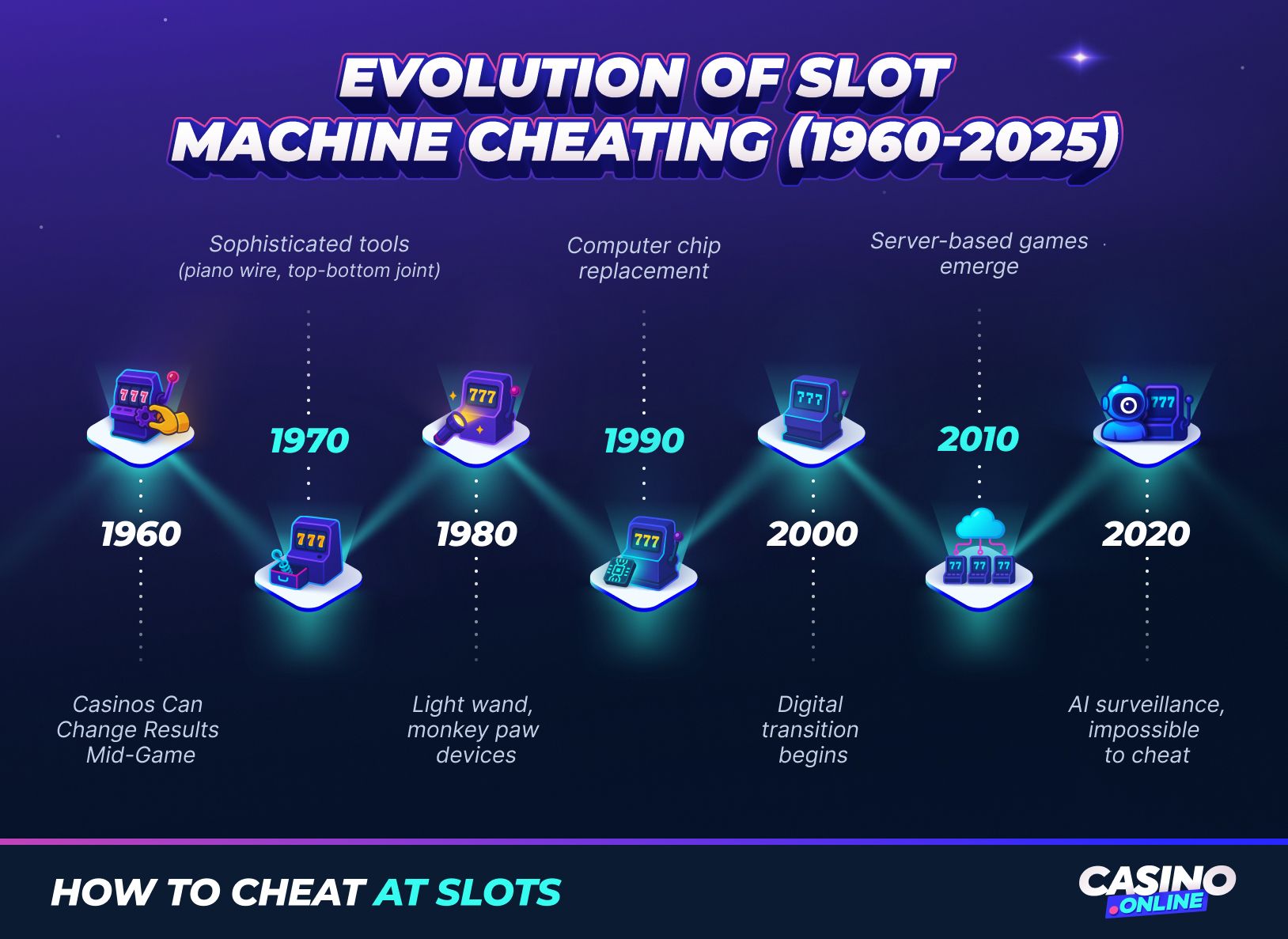
Historical Slot Machine Cheating Methods (1960s - 2020s)
Before modern security, mechanical slots had real vulnerabilities that clever people exploited for decades. These methods weren't desperate gambles - they were sophisticated techniques that worked until technology caught up.
The era of mechanical slots
Picture this: It's 1960, and slot machines are sophisticated clockwork toys. Mechanical reels, physical coin mechanisms, and simple electrical circuits. These weren't the computer-controlled machines we see today - they were mechanical systems with mechanical weaknesses.
The beauty for cheaters was simplicity. Every moving part could potentially be manipulated if you understood the mechanics. The coin acceptor had to physically verify coins. The reels stopped based on mechanical timing. The payout system relied on physical triggers. Where there's physical interaction, there's opportunity.
Coin-Based hacks
The "yo-yo" trick became legendary in cheating circles. Drill a hole in a coin, thread fishing line through it, drop it in to trigger the credit mechanism, then yank it back out. Rinse and repeat. Casinos caught on fast, but for a brief window, it worked.
Shaved coins were more sophisticated - file down the edges so they'd register as valid but fall through to be retrieved. Slugs (fake coins made from cheaper metals) worked until casinos installed weight sensors. The cat-and-mouse game accelerated with every security upgrade.
Physical manipulation
Strong magnets could influence mechanical reels during the moment they were slowing down. Coat hangers bent into specific shapes could trip internal mechanisms through ventilation slots. Some desperate players tried brute force - hitting, shaking, or tilting machines to jar reels into winning positions.
The most audacious was the "monkey paw" - a guitar string attached to a metal claw, designed to snake through the coin chute and manipulate the coin counting mechanism from inside the machine.
The user would feed coins to establish credits, then insert the monkey paw to trigger additional credits without depositing more money. It required knowledge of each machine's internal layout and the dexterity of a surgeon, but in skilled hands, it worked.
Why those old tricks are now obsolete
The mechanical vulnerabilities that powered historical cheating simply don't exist anymore. No coin mechanisms to fool. No mechanical reels to influence. No physical payout systems to manipulate. Everything is digital, encrypted, and monitored in ways the legendary cheaters never had to deal with.
Even if you somehow managed to access internal components (which would trigger multiple alarms instantly), you'd find hardened computer systems using security techniques that didn't exist when Tommy and Dennis were operating. Bringing a knife to a nuclear war doesn't describe it - it's not even in the same universe.

Opinion of Andrew Collins
“ Brilliant cheaters made millions for decades. Then technology caught up. The golden age of slot cheating died by innovation. ”
Famous Slot Machine Cheaters & Their Stories
The history of slot cheating has its legends - brilliant minds who turned machine manipulation into art. These aren't fictional characters; they're real people whose schemes netted millions before landing them in handcuffs.
Tommy Glenn Carmichael - The legend
If there's a Mount Rushmore of slot cheaters, Tommy's face would be carved largest. This guy didn't just cheat slots - he revolutionized slot cheating. Starting in the 1980s, Tommy developed a series of devices that exploited the evolution of slot machine technology.
His masterpiece was the "light wand" - a device that could blind the light sensor counting coins during payouts. Insert it at the right moment, and the machine would think it hadn't paid out yet, triggering additional payments. Tommy reportedly made millions before his capture.
But here's the kicker: Tommy was so good at understanding slot machine mechanics that after serving his time, Nevada hired him as a consultant to help prevent the cheating methods he'd pioneered. Talk about turning the tables.
Dennis Nikrasch - The "King" of slot cheats
Dennis took a different approach - if you can't beat the machine from outside, change it from inside. This former locksmith turned slot technician had legitimate access to machines for maintenance. He'd replace computer chips with modified versions programmed to pay out jackpots on command.
His most famous heist netted $6 million from a single Megabucks machine in 1998 at a Las Vegas casino. The scheme was brilliant in its simplicity: install compromised chips, return with accomplices, hit the programmed sequence, collect the jackpot. Dennis's downfall came through an informant - someone in his crew got spooked and turned evidence.
Ronald Dale Harris - The code-cracking engineer
Ronald represents the evolution from mechanical manipulation to digital exploitation. As a Nevada Gaming Commission employee, he had knowledge of machine software and testing procedures. He developed algorithms to predict the behavior of certain slot machine random number generators by analyzing their source codes.
What made Ronald dangerous was his credentials - who suspects the guy responsible for testing slot machine fairness of cheating the machines he certifies? His scheme involved identifying patterns in supposedly random sequences and sharing this intelligence with accomplices who'd place strategic bets.
Louis Colavecchio - The master of counterfeit tokens
Before casinos switched to cashless systems, they used tokens. Louis, nicknamed "The Coin," was a counterfeiting genius who produced fake slot tokens so perfect that casinos couldn't tell the difference. His operation spanned multiple states and generated millions.
Louis's downfall shows a crucial point: even the most sophisticated cheating operations eventually crumble. Patterns emerge, surveillance improves, and someone always talks. He spent years in federal prison and lost everything he'd gained.

Opinion of Andrew Collins
“ These were the most intelligent cheaters ever. Every single one ended up in prison. Success in the past doesn't guarantee it now. ”
Advanced Technical Cheating Methods
Beyond basic coin tricks lay sophisticated devices that required genuine engineering skill. These methods represent the peak of analog-era cheating technology - elegant solutions to mechanical problems.
Light wand technique
Tommy Carmichael's light wand deserves its own deep dive because it shows the pinnacle of analog-era slot cheating. The device exploited a fundamental design flaw in 1980s-1990s slot machines: they used optical sensors to count coins during payout sequences.
The wand was a miniature flashlight on a flexible cable, thin enough to snake through the coin chute. When inserted at the right moment during a payout, it would blind the optical sensor, causing the machine to "think" no coins had been dispensed. The machine would continue paying out until stopped.
What made this insidious was the skill required - it wasn't just about having the device, but knowing exactly when and how to use it. Tommy reportedly practiced for hours to perfect the timing.
Monkey paw device
The monkey paw sounds like something from a horror movie, and for casinos, it was. This device consisted of a guitar string attached to a metal claw, designed to snake through the coin chute and manipulate the coin counting mechanism from inside the machine.
The user would feed coins to establish credits, then insert the monkey paw to trigger additional credits without depositing more money. It required knowledge of each machine's internal layout and the dexterity of a surgeon, but in skilled hands, it worked.
Top-Bottom joint
The top-bottom joint was elegantly simple - a two-piece coin designed to fool the coin acceptor mechanism. The top piece would trigger the coin sensor while the bottom piece would fall through to the return chute, ready to be used again.
Manufacturing these required precision metalwork and knowledge of coin acceptor tolerances. Each machine model required custom-crafted joints, making this a highly specialized skill.
Piano wire method
This technique targeted the mechanical linkages inside older slot machines. By threading piano wire through ventilation slots or access points, cheaters could manipulate internal mechanisms that controlled reel positioning or payout triggers.
Success required an almost supernatural understanding of mechanical systems. One wrong move could jam the machine, trigger alarms, or leave evidence of tampering.
Computer chip replacement
As slots evolved from mechanical to electronic, so did cheating methods. The most sophisticated approach involved replacing legitimate computer chips with modified versions programmed to pay out on command.
This required inside access (like Dennis Nikrasch had) or breaking into machines during off-hours. The modified chips would function normally until specific button sequences were entered, then trigger massive payouts.
Bill validator hacks
When casinos introduced bill acceptors, cheaters found vulnerabilities. Early systems could be fooled by bills with tape applied in specific patterns, photocopied currency, or foreign bills that registered as legitimate denominations.
One famous technique involved "bill stringing" - attaching fishing line to real bills, inserting them to register credits, then pulling them back out. Like the yo-yo coin trick, this exploited the mechanical nature of early bill validation systems.

Opinion of Andrew Collins
“ Knowing HOW cheating worked is educational. Knowing it DOESN'T work anymore is crucial. Every 1980s technique is completely obsolete. ”
Modern Slot Machines: Why Cheating Is Nearly Impossible
Modern slot machines operate on three interconnected security layers that make cheating impossible for individual actors. These aren't redundant safeguards - they're independent systems, each sufficient to stop cheating on its own.
How modern security works: Side-by-Side comparison
Layer 1: Encrypted random number generation
Modern slot machines don't use mechanical randomness - they use Random Number Generators running on secure computer chips. These RNGs generate thousands of random numbers per second, even when no one's playing. When you press spin, you're not determining the outcome. You're telling the machine to use whatever random number it generated at that precise microsecond.
That number was locked in before your finger touched the button.
The encryption protecting these numbers is military-grade AES-256. A standard computer would need centuries to brute-force crack this encryption, even running calculations 24/7. Quantum computers might eventually change this timeline, but we're talking technology that doesn't exist yet in practical form.
The math is simple: the game can't be beaten from outside because the outcome exists before you play. No device you could build or smuggle into a casino changes this fact.

What is Random Number Generation?
Layer 2: Server-Based gaming architecture
Many modern slots don't determine outcomes locally anymore. The machine you're playing is a display terminal. The actual game logic runs on heavily encrypted, off-site servers monitored 24/7 by casino security teams.
This architecture means there's no local hardware to tamper with. You can't open the machine because it won't communicate without verification from remote servers. You can't modify software because every byte gets checked against known-good versions stored in tamper-proof memory. You can't intercept network traffic because the encryption is the same technology protecting banking systems.
The gap between what an individual could accomplish and what modern security requires is insurmountable. Dennis Nikrasch pulled off his chip-replacement scheme in the 1990s because machines were standalone devices. Try that today and the machine detects tampering within milliseconds and alerts casino security.
Layer 3: Real-Time surveillance and monitoring
Every slot machine connects to casino security systems that monitor play in real-time. Open a cabinet? Immediate alert. Unusual payout pattern? Flagged instantly. Even the software gets verified against known-good checksums.
The surveillance systems use AI that would impress government intelligence agencies. Facial recognition identifies known cheaters before they reach the slot area. Behavioral analysis software spots unusual betting patterns - players who make minimum bets then suddenly max out just before wins, teams coordinating play, or devices being used during gameplay.
The system learns continuously. Each caught cheater teaches it to recognize similar patterns. The Russian PRNG hackers thought they were clever. Casino security caught them through behavioral analysis - they won too much, too consistently, in ways that violated probability.

Opinion of Andrew Collins
“ With unlimited money, expertise, and access? You still couldn't beat a modern slot machine. The odds are mathematically impossible. ”
The Russian PRNG Hack: A Modern Case Study
Here's a story that proves even I can be surprised by the ingenuity of determined cheaters. In the mid-2010s, a Russian team accomplished something that shouldn't have been possible - they found a way to predict certain slot machine outcomes.
How the group exploited PRNG vulnerabilities
This wasn't your grandfather's slot cheating. The Russians identified that certain older slot machines used pseudorandom number generators (PRNGs) with predictable patterns. By recording gameplay videos and analyzing the timing and outcomes of thousands of spins, they reverse-engineered the algorithms.
Think about that for a moment. They watched hours of slot machine footage, tracked every outcome, noted every timing pattern, and found the mathematical formula the machines were using.
Using smartphones loaded with custom apps, team members could predict upcoming outcomes with scary accuracy. They'd play normally, making minimum bets for long stretches. Then the app would indicate a big win was coming, and they'd max out their bets. To anyone watching, they just seemed incredibly lucky.
Casinos targeted and how they got detected
The operation started in Eastern Europe and spread to the United States. The team targeted casinos in multiple jurisdictions, rotating through locations to avoid detection. They won at rates that should have been statistically impossible given their total playing time.
Their mistake? Being too successful. Casino security noticed something odd - players who would make minimum bets for long periods, then suddenly max-bet just before jackpots hit. That behavior violates statistical probability. Lucky players don't know when to bet big. They just bet big or they don't.
The pattern was subtle but unmistakable once investigators knew what to look for. Video analysis revealed the smartphone use during critical moments. Team members were glancing at their phones, then making sudden betting changes. That's when casino security knew they weren't dealing with luck - they were dealing with technology.
Global response and security upgrades
The discovery sent shockwaves through the casino industry worldwide. Within weeks, casinos began auditing their entire slot machine inventories, identifying vulnerable models and checking for similar exploitation patterns. Manufacturers issued emergency software patches and redesigned RNG systems to close the vulnerability.
The response wasn't just technical - it was strategic. Casinos implemented new policies:
- Stricter smartphone use - restrictions near slot machines
- Enhanced behavioral analysis software to detect unusual betting patterns
- Cross-casino data sharing to identify team-based operations
- Upgraded PRNG systems with true random number generation based on physical entropy sources
The incident proved that even modern security isn't foolproof, but it also showed how fast the industry responds to new threats. Within months, the vulnerabilities were patched, and the window for this type of exploitation was permanently closed.
Criminal prosecution and outcomes
Multiple team members were arrested and faced serious criminal charges across several jurisdictions. The ringleaders received prison sentences ranging from 2 to 8 years in federal facilities. Beyond the prison time, they forfeited millions in seized assets - money, property, vehicles, and bank accounts all confiscated.
The legal consequences served as a stark reminder that even sophisticated, successful cheating operations end in disaster for their perpetrators. These weren't amateurs - they were skilled mathematicians and programmers who understood probability theory and computer systems. And they still got caught.
More important, the case showed how modern surveillance and investigation techniques make it impossible to operate cheating schemes indefinitely. The digital trail - smartphone records, casino footage, betting patterns, travel records - all led back to the perpetrators. There's no such thing as a perfect crime in the digital age.
What this case teaches us
The Russian PRNG hack represents both the peak of modern slot cheating and its ultimate futility:
Smart people can find vulnerabilities. The team was brilliant. They identified a real weakness in older PRNG systems and exploited it with custom-built technology.
The window is always temporary. From first exploit to security patch took only months. Even at their peak, the team knew their method had an expiration date.
Detection is inevitable. No matter how careful they were, the mathematical improbability of their wins flagged them to security AI that watches for exactly these patterns.
Consequences destroy lives. Years in prison, financial ruin, criminal records that follow forever. The short-term gains evaporated under the weight of long-term consequences.
This case proves my central point: modern casino security catches exploits fast. Justice follows. Always.
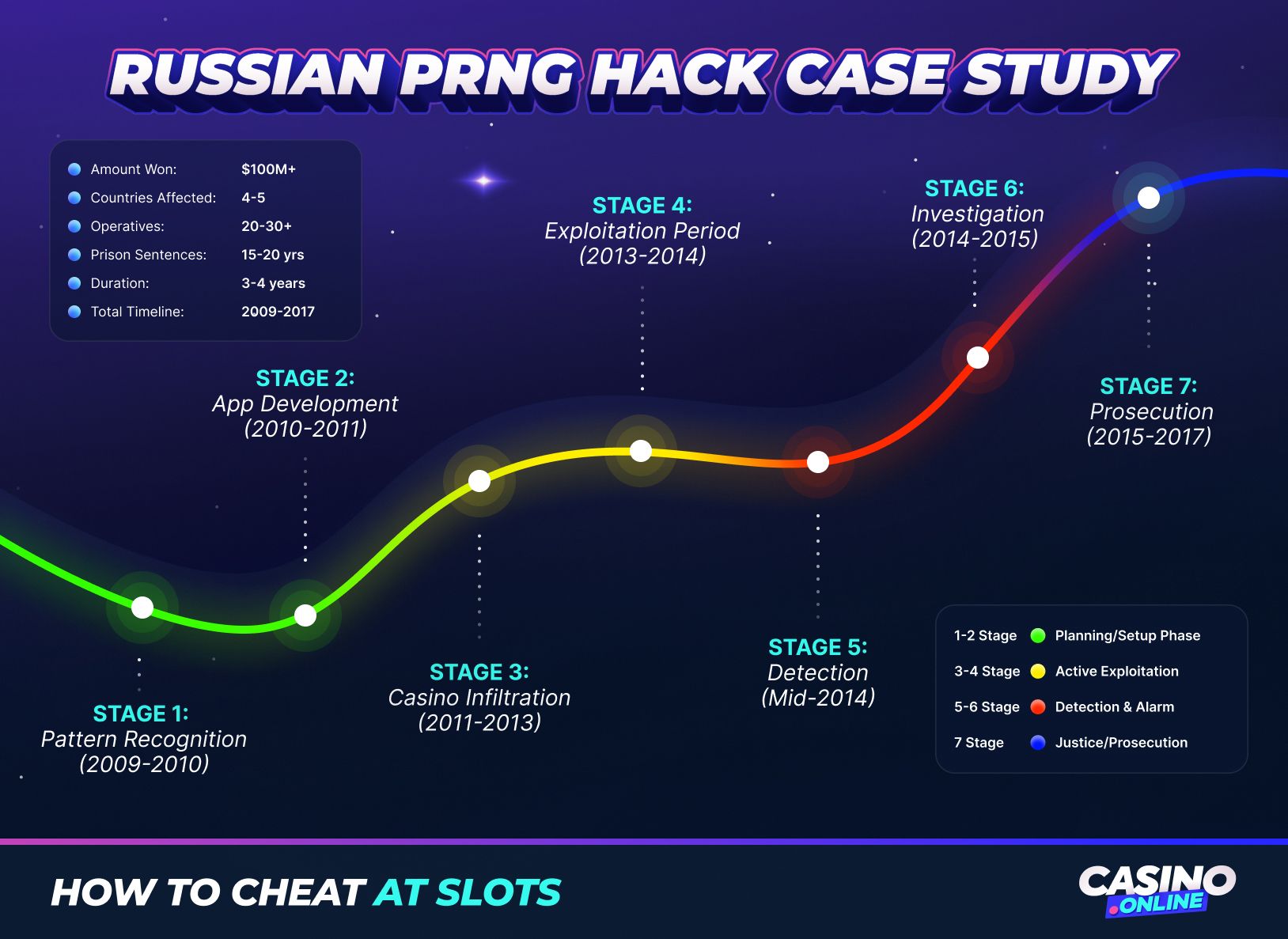

Opinion of Andrew Collins
“ They were brilliant. They won $100 million. They're in prison for 15-20 years. Cheating always ends the same way. ”
Online Slot Machines: Can They Be Hacked?
If land-based slots are Fort Knox, online slots are the entire U.S. military-industrial complex. The security layers are so extensive that even discussing them feels like revealing state secrets.
Security comparison: Online vs. Land-Based
Online slots face threats that land-based machines never encounter - hackers from around the world, 24/7 automated attack attempts, and the constant pressure of protecting millions of simultaneous players. The security response has been proportional.
Every spin is processed on secure servers using enterprise-grade hardware security modules (HSMs). The communication between your device and the server uses the same encryption that protects banking transactions. The random number generation uses certified entropy sources that make slot machine RNGs look primitive.
Advanced fraud detection tech
Online casinos employ AI systems that can detect unusual play patterns in real-time. Behavioral analysis, device fingerprinting, geolocation verification - they know more about your playing habits than you do. Any deviation from normal patterns triggers investigation.
Machine learning algorithms trained on millions of gaming sessions can spot potential cheating attempts before they even fully develop. The system learns continuously, adapting to new threats faster than any individual cheater could develop countermeasures.
Licensing requirements for casinos and providers
Legitimate online casinos operate under strict licensing requirements that mandate extensive security measures. Regular audits by independent testing laboratories verify that games operate fairly and securely. Any casino that fails these audits loses its license - and its business.
The software providers who create online slots are subject to even stricter requirements. Companies like Microgaming, NetEnt, and Playtech invest millions in security because their business model depends on unbreachable integrity.

Best Casino Software
Busting the "Online Slot Cheat" myth
Here's my investigative journalist truth bomb: every "online slot hack" you'll find is either a scam designed to steal your money or malware designed to compromise your devices. The mathematical and technological realities make genuine online slot cheating impossible for individual actors.
The scammers know this, but they also know that desperate players will pay for false hope. Don't be their next victim.

Opinion of Andrew Collins
“ Online slots are more secure than land-based machines. Military-grade encryption beats physical security every time. ”
How Casinos Detect and Prevent Cheating
Let me pull back the curtain on something most players never see - the sophistication of modern casino security. Having worked closely with casino operations for over a decade, I can tell you that what happens behind the scenes would make your head spin.
How surveillance has evolved
Gone are the days of grainy black-and-white cameras and security guards squinting at monitors. Modern casino surveillance is more advanced than most government intelligence operations. We're talking 4K cameras with facial recognition, behavioral analysis software, and AI systems that can spot potential cheating before human observers even know something's wrong.
The eye-in-the-sky now has thousands of digital eyes, each capable of tracking multiple players at once. Every machine, every table, every square inch of casino floor is monitored by systems that never blink, never get distracted, and never forget a face.
CARDS System, AI, and facial recognition
The Casino Anti-fraud Recognition Database System (CARDS) is like the FBI's most-wanted list, but for casino cheaters. Get caught once, and your face goes into a database shared among casinos worldwide. Walk into any participating casino anywhere in the world, and facial recognition software will identify you within seconds.
But it goes deeper than recognizing known cheaters. AI systems analyze body language, betting patterns, device usage, and dozens of other behavioral indicators to identify threats. The system learns continuously - every caught cheater teaches it to recognize similar patterns.
Employee training & anti-cheat protocols
Casino employees undergo extensive training to recognize cheating attempts. Slot attendants know the warning signs: players who seem overly familiar with specific machines, unusual betting patterns, electronic devices being used during play, or groups of players who appear to coordinate their activities.
The training goes beyond obvious signs - employees learn to spot subtle behavioral tells that indicate someone might be attempting to cheat. Nervousness, excessive attention to machine details, or unusual reactions to wins and losses can all trigger closer scrutiny.
Regulatory audits & oversight
Gaming commissions don't just license casinos and walk away - they maintain oversight. Random audits, surprise inspections, and mandatory reporting ensure that casinos maintain the highest security standards. Any casino that fails to properly detect and report cheating attempts faces severe penalties, including license revocation.
The regulatory framework creates multiple layers of accountability. Casinos police themselves, regulators police the casinos, and independent auditors police everyone. Cheating doesn't just have to fool the casino - it has to fool an entire ecosystem designed to catch it.
Check our casino scandal database, which documents major cases where operators caught cheaters and faced legal consequences.

Opinion of Andrew Collins
“ Cameras don't fool. AI learns in milliseconds. Detection isn't a possibility anymore - it's a guarantee. ”
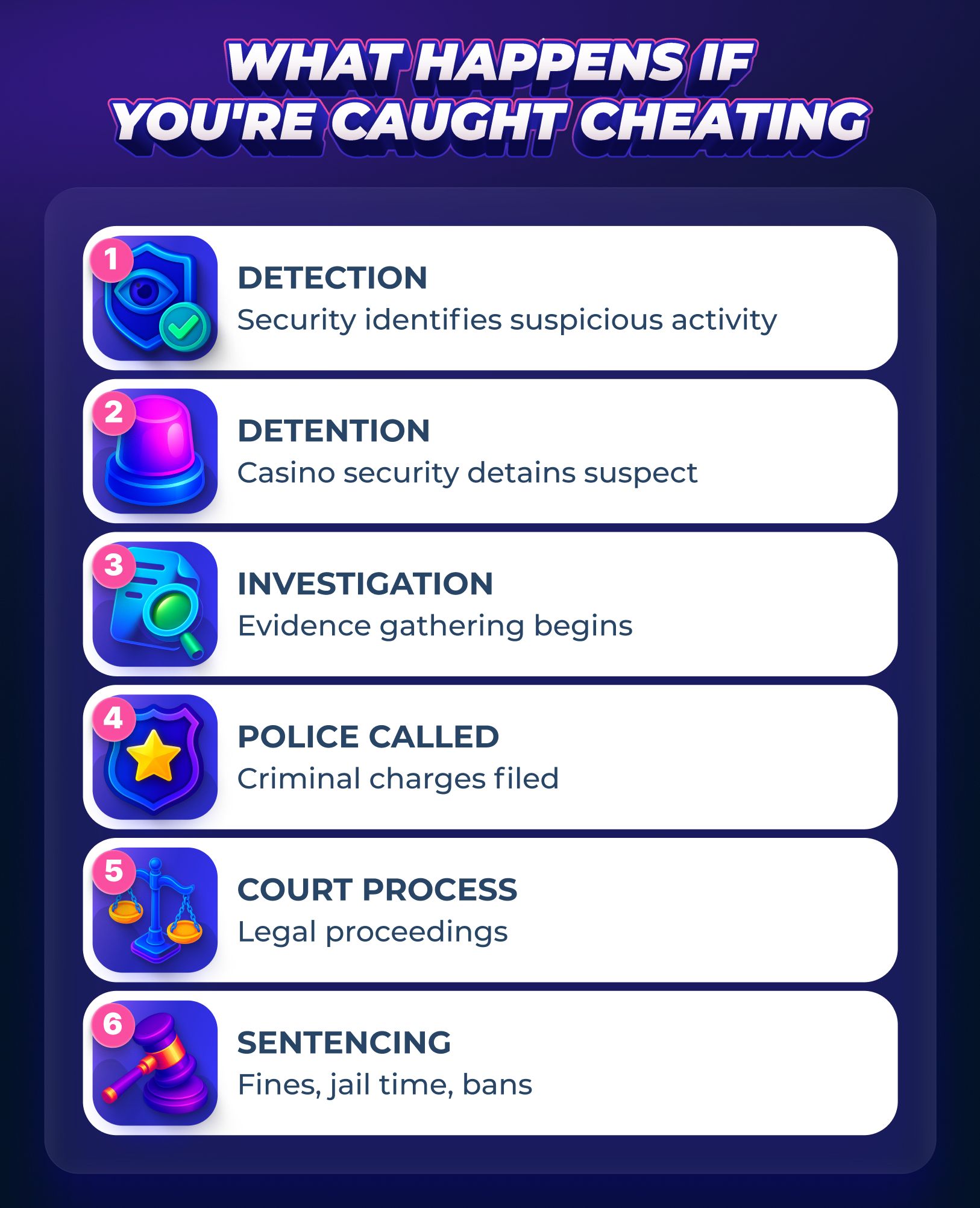
Legal Consequences of Slot Machine Cheating
Here's where the rubber meets the road, and it's uglier than a three-day Vegas hangover. The legal consequences of slot machine cheating aren't just serious - they're life-destroying.
U.S. Federal and State penalties
Under federal law, slot machine cheating can be prosecuted as wire fraud, computer fraud, or racketeering, depending on the methods used. We're talking potential sentences of 20 years or more in federal prison. And federal sentences? They don't mess around with parole - you serve at least 85% of whatever sentence you get.
State penalties vary, but Nevada (where most famous cases were prosecuted) treats slot machine cheating as a felony. First offense? Up to 6 years in prison and $10,000 in fines. Multiple offenses or large amounts involved? You're looking at decades behind bars.
But here's the kicker that most people don't realize: casinos can pursue civil damages. Win $50,000 through cheating? You're not just facing criminal charges - you could be sued for triple damages plus legal fees. That $50,000 win could cost you $200,000+ in civil judgments.
International laws (UK/EU, Asia, Australia)
Think cheating slot machines is a slap on the wrist in other jurisdictions? Think again. The UK treats it as fraud, with maximum sentences of 10 years. Australia can impose sentences up to 25 years for serious cheating offenses. Singapore doesn't mess around - cheating in their casinos can result in both imprisonment and caning.
European Union countries treat casino cheating as fraud, with penalties varying by jurisdiction but uniformly severe. And here's something that'll make you think twice: many countries share criminal databases, meaning a conviction for cheating in one country can affect your ability to travel, work, or obtain visas elsewhere.
Civil vs. Criminal cases
Criminal prosecution is just the beginning. Casinos file civil suits to recover losses and punitive damages. While criminal cases require proof beyond a reasonable doubt, civil cases only require a preponderance of evidence - a much lower standard.
This means even if you somehow avoid criminal conviction (unlikely), you can face financial ruin through civil judgments. Unlike criminal penalties, civil judgments can follow you for decades, accruing interest and affecting your credit rating.
Real court cases and prison sentences
Let me give you some reality checks from actual court records.
- Tommy Carmichael? He served multiple prison sentences totaling more than a decade.
- Dennis Nikrasch? Died in federal prison serving a 20-year sentence.
- The Russian PRNG team? Multiple members received sentences ranging from 2-8 years in federal prison.
These aren't slaps on the wrist - these are life-altering consequences. And every single one involved people who were considered the absolute best at what they did. If the masters couldn't avoid consequences, what makes anyone think they could do better?
Global Gambling Regulation Report

Opinion of Andrew Collins
“ Federal charges. 20+ years in prison. No bank hires you. No landlord rents to you. Worth one big win? ”
Software Glitches: When Casinos Owe (Or Don't)
Here's where things get legally murky in ways that would make any investigative journalist's ears perk up. What happens when the machine itself malfunctions and shows a jackpot that wasn't legitimately won?
When a malfunction pays "too much"
Software glitches do happen, and sometimes they result in displays showing massive winnings that weren't actually won according to the game's mathematics. The most famous case involved a player in New York who was shown a $42 million jackpot on a machine with a maximum payout of $6,500.
These situations create fascinating legal questions. The player didn't cheat - they played legitimately and the machine displayed a win. But the win wasn't mathematically valid according to the game's programming. So who's responsible?
Real glitch stories and legal precedents
Court cases have sided with casinos, ruling that players are entitled to what they would have legitimately won, not what malfunctioning displays showed. The New York player mentioned above received the maximum legitimate payout of $6,500, not the displayed $42 million.
But there have been exceptions. In cases where casinos were found to have inadequate quality control or knowingly operated faulty machines, courts have sometimes awarded the displayed amounts or substantial settlements.
The "Malfunction Voids All Pays" Rule
Nearly every slot machine displays some variation of "Malfunction voids all pays." This disclaimer provides legal protection for casinos when software errors occur. But the disclaimer isn't absolute - casinos still have obligations to maintain proper equipment and operate fairly.
The key lesson for players: legitimate glitch wins are rare, unpredictable, and usually result in lengthy legal battles even if you ultimately prevail. It's not a strategy worth counting on.

Opinion of Andrew Collins
“ You hit $42 million on a $6,500 machine? Courts ruled: glitch wins void. Hope for a glitch? That's fantasy. ”
Ethical Considerations & Gambling Addiction
This is where my investigative journalist persona has to step aside for a moment, because we need to have a serious conversation about the darker side of why people search for cheating methods.
Why cheating and addiction are connected
In my years covering the gambling industry, I've seen the pattern repeatedly: people searching for slot machine cheats aren't usually criminal masterminds - they're often individuals struggling with gambling addiction who see cheating as their only way out of a financial hole.
The psychology is understandable but dangerous. When you're down thousands of dollars and facing financial ruin, the promise of a "guaranteed system" becomes incredibly appealing. It's the same desperation that makes people fall for lottery scams, Ponzi schemes, and other too-good-to-be-true propositions.
Real risks: Finances, reputation, and jail
But here's the brutal truth: attempting to cheat doesn't solve gambling problems - it makes them exponentially worse. You're not just risking the money you don't have; you're risking your freedom, your reputation, and your future employability.
A criminal record for fraud or cheating can destroy career prospects, affect your ability to obtain credit, housing, or professional licenses, and strain relationships with family and friends.

Opinion of Andrew Collins
“ The temporary thrill of "beating the system" gets erased by years or decades of consequences. ”
Where to find help (problem gambling resources)
If you're reading this because you're struggling with gambling problems, please reach out for help. Multiple resources are available 24/7, all free and confidential::
- National Council on Problem Gambling: 1-800-522-4700
- BeGambleAware (UK): 0808 8020 133
- Gambling Therapy (International): Free online support
- Gamblers Anonymous: Local meetings worldwide
If you want to understand the signs before addiction takes hold,
learn to recognize and prevent gambling addiction through our comprehensive guide.

Opinion of Andrew Collins
“ Remember: there's no shame in seeking help, but there's tremendous risk in trying to solve gambling problems through cheating. ”
Legitimate Ways to Improve Your Odds at Slots
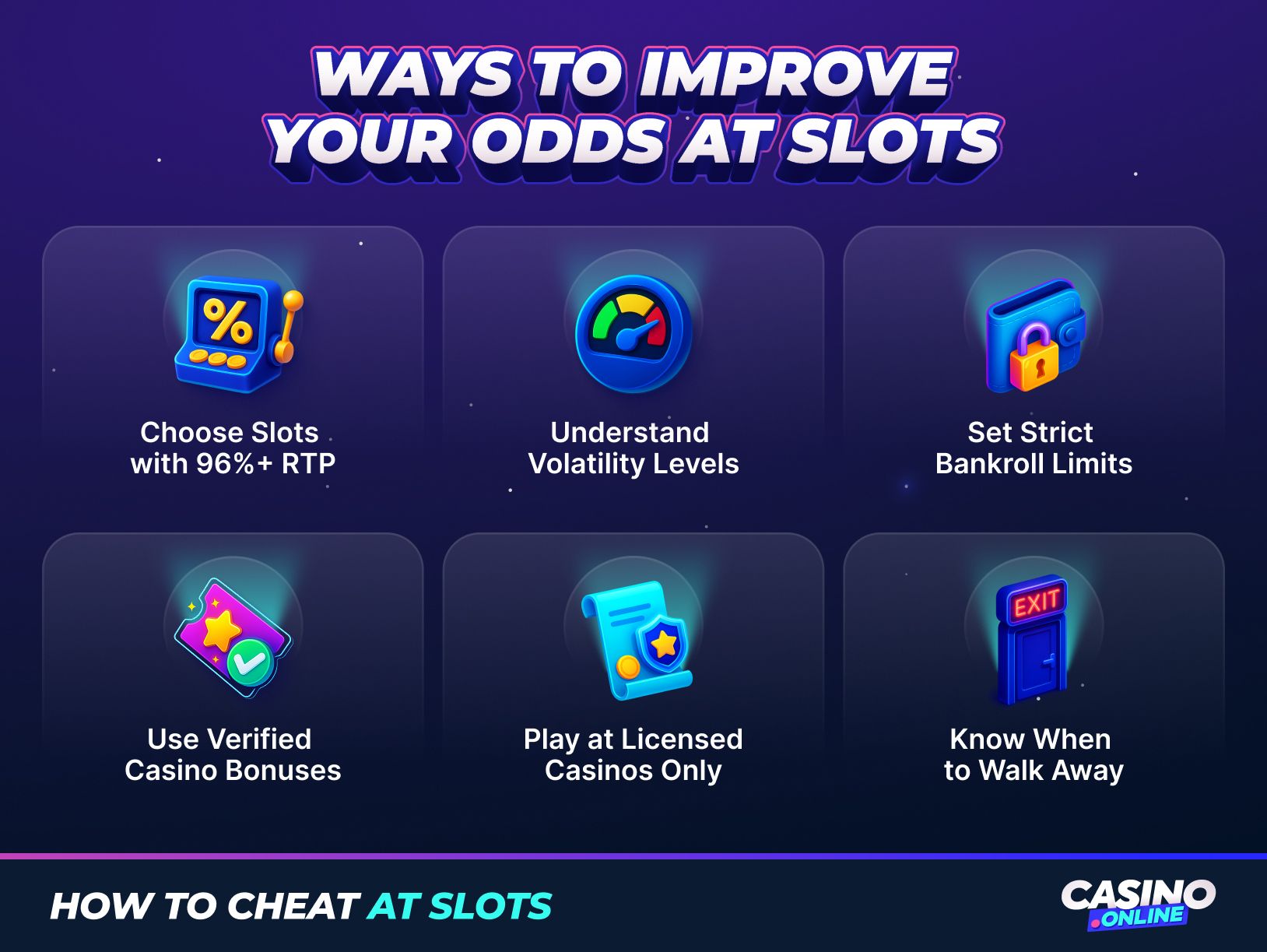
Finally, we get to the good stuff - legal, ethical ways to improve your slot machine experience. This is where my decades of industry experience can help you instead of crushing your dreams.
RTP (Return to Player) - What it means for you
Return to Player percentage is your best friend in the casino. It tells you how much of every dollar wagered is returned to players over time. A 96% RTP means that for every $100 wagered, $96 is returned to players (and $4 goes to the house).
Here's the insider knowledge: RTPs vary dramatically between different slots, even in the same casino. Penny slots often have RTPs in the 88-92% range, while high-limit slots offer 96-98% RTPs. Always check the game information screen for RTP details - it's required to be displayed somewhere in the game.

Here are the top RTP games
Slot volatility: Picking the right game
Volatility (also called variance) determines how often and how much slots pay out. Low volatility slots pay smaller amounts more frequently. High volatility slots pay larger amounts less frequently. Medium volatility is somewhere in between.
Match the volatility to your playing style and bankroll. If you want longer playing sessions with smaller wins, choose low volatility. If you're chasing big jackpots and can handle long losing streaks, high volatility might be your game. Most players do best with medium volatility slots.
For a breakdown of which games offer the best odds for your specific playing style, see our guide to casino games with the best odds.
Bankroll management tips
This is where most players fail, and it has nothing to do with the casino games themselves. Set a loss limit before you start playing and stick to it. Never gamble with money you can't afford to lose. Never chase losses by increasing bet sizes or playing longer sessions.
A good rule of thumb: bring enough money for 200-300 spins at your chosen bet level. This gives you enough play time to hit some wins while protecting you from bad luck destroying your entire bankroll in minutes.
Bonus hunting (with legal fine print)
Casino bonuses can provide real value if you understand the terms and conditions. Look for bonuses with reasonable wagering requirements (30x or lower), games that contribute 100% toward requirements, and realistic time limits for completion.
Read the fine print carefully - some bonuses have maximum withdrawal limits, restricted games, or other conditions that make them less valuable than they appear. When done correctly, bonus hunting can extend your playing time and increase your chances of hitting big wins.
Progressive jackpot strategies
Progressive jackpots can offer life-changing payouts, but they require specific strategies. Only play progressives when the jackpot is well above the average hit amount - this ensures positive expected value. Always play maximum coins if required for jackpot eligibility (or don't play at all).
Research the average jackpot amounts for games you're considering. Many progressives publish historical data showing average jackpot sizes, hit frequency, and other valuable information for strategic players.
How to spot fair, high-payout machines
Look for casino games from reputable providers (Microgaming, NetEnt, IGT, Aristocrat) that publish RTP information. Avoid games that don't disclose RTPs or come from unknown providers. Check for third-party certification from testing laboratories like eCOGRA, GLI, or iTech Labs.
In land-based casinos, higher denomination machines offer better RTPs. $5 slots typically have better RTPs than penny slots. Machines in high-traffic areas (near entrances, food courts, etc.) often have tighter RTPs than machines in quieter areas.
Not sure which specific slots to play? Our guide to the best RTP slots breaks down the top games by payback percentage and helps you identify which machines offer the highest return to players.

Opinion of Andrew Collins
“ You can't beat the house long-term. But you absolutely can beat the odds short-term through luck and smart play. ”
How to Choose Safe & Fair Online Casinos
This is where my investigative skills really pay off. After years of examining online casino operations, I can spot red flags from a mile away.
Licensing: What to check before you play
Never play at unlicensed casinos, period. Look for licenses from reputable jurisdictions: UK Gambling Commission, Malta Gaming Authority, Curacao eGaming, or Gibraltar Regulatory Authority. These licenses require strict operational standards and player protections.
Verify the license is current and legitimate by checking the regulator's website. Fake license claims are common among rogue operators. A legitimate license number should be verifiable through official regulatory databases.
RTP disclosure and third-party audits
Legitimate casinos publish RTP information for all their games and undergo regular audits by independent testing laboratories. Look for audit reports from companies like eCOGRA, iTech Labs, or GLI posted on the casino's website.
Be suspicious of casinos that don't provide RTP information or claim "proprietary" games that can't be verified. These are often rigged machines designed to cheat players.
Red Flags - How to spot a rogue casino
Warning signs include: no valid license, poor customer service, delayed or refused withdrawals, unreasonable bonus terms, negative player reviews citing payment issues, and games from unknown providers without verifiable RTPs.
Trust your instincts - if something feels off about a casino's operations, find another place to play. The legitimate online casino market is huge and competitive; there's no reason to risk your money with questionable operators.
Check reviews
After checking licensing, RTP disclosure, and audits, the final step is simple: play at a casino you can trust.
Our casino reviews page identifies operators that meet ALL these criteria - legitimate licenses, fair games, transparent RTPs, and excellent player protections. Every casino on our list has been verified for compliance with international standards and player safety requirements.
Don't gamble at just any operator. Start with a casino that's already been vetted against the standards you've just learned.

How We Rate Casinos

Opinion of Andrew Collins
“ Legitimate casinos have nothing to hide. Rogue casinos hide everything. One pays you. The other steals. ”

RTP
96.50%
Payout time
0-2 Hours
Payments
-
$750 + 50 Free Spins
25 Free Spins without deposit
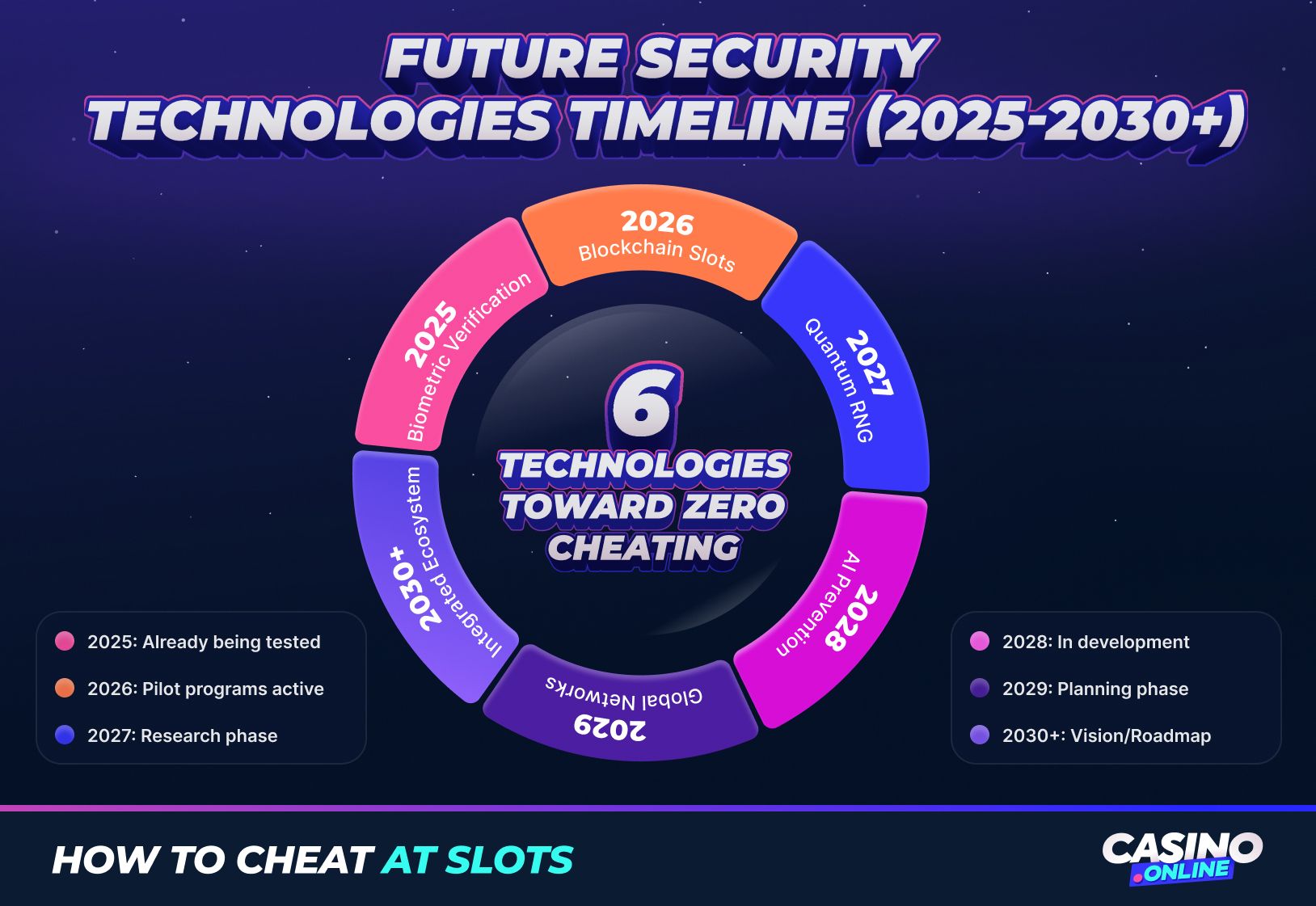.jpg)
The Future of Slot Security
As someone who's witnessed the technological evolution of slot machines firsthand, I can tell you that the future of slot security will make today's systems look primitive.
Blockchain slots and provable fairness
Blockchain technology is beginning to enable "provably fair" gambling, where every game outcome can be verified by players. This eliminates any possibility of casinos manipulating results while also making cheating mathematically impossible.
Smart contracts will automate payouts based on predetermined, unalterable rules. Players will be able to verify that every spin was truly random and that payouts match the published odds.
Biometric verification
Expect to see biometric identification become standard in high-limit slot areas. Fingerprint, facial recognition, and even DNA verification will make it impossible for banned players or known cheaters to access games.
This technology will also enable sophisticated player tracking that could identify problem gambling behaviors in real-time, triggering intervention resources before players suffer serious harm.
AI-Powered fraud detection
AI systems will become even more sophisticated at identifying unusual play patterns, coordinated cheating attempts, and other fraudulent activities. Machine learning algorithms will evolve to stay ahead of new cheating methods.
These systems will also distinguish between legitimate lucky streaks and genuine cheating attempts, reducing false positives while catching actual fraud more effectively.
The quantum future: Next-Gen RNG
Quantum random number generators will provide truly unbreakable randomness based on quantum mechanical processes. These systems will make even theoretical attacks on RNG systems impossible, closing the final remaining vulnerabilities.

The Future of Online Slots

Opinion of Andrew Collins
“ Quantum RNG. Biometric verification. AI prediction. By 2030, cheating becomes theoretically impossible. ”
Conclusion: Why Cheating Isn't Worth It
After a decade in this industry, I'll be blunt: slot machine cheating is finished. Done. Over.
The methods that worked decades ago? Light wands, devices modified to manipulate reels, fake tokens - they're all useless now. Modern machines have encryption that would make military security jealous. Cameras watch every angle. Software monitors spins in real-time. It's impossible to beat them.
And the people who tried? They lost badly.
Tommy Glenn Carmichael won big but spent most of his life behind bars. Dennis Nikrasch? Prison sentence after prison sentence. The Russian hackers who figured out the PRNG code walked away with $100 million - then got hit with 15 to 20 year sentences. Brilliant minds, every one. Broken lives, every one.
The risks have gotten worse, not better. Federal charges now. Multi-year prison terms. Your record stays with you forever. A bank won't hire you. A landlord won't rent to you. That brief winning streak destroys decades of your future.
So what actually works? Simple stuff:
Pick machines with high RTP numbers - 96% or better. Manage what you spend. Don't bet money you need for bills. Use actual bonuses from legit casinos. Stop when you've lost your limit.
Will you beat the house edge long-term? No. Can you win big in the short run? Yes. Players do it every day. That's the real thrill - hitting it big legitimately.
Struggling with gambling? Help exists. It's free. It's private. Call the National Council on Problem Gambling at 1-800-522-4700. Or visit Gambling Therapy online. Millions of people get help. You can too.
Our Responsible Gambling guide

Opinion of Andrew Collins
“ Be smart. Stay legal. Maybe your next spin changes everything. ”
Still have questions about slot cheating?
Can you actually cheat slot machines in 2026?
No. Modern slot machine games use encrypted RNG systems, server-based gaming, and AI surveillance that make cheating mathematically and practically impossible for individual actors.
What happens if you get caught cheating at slots?
Criminal charges including fraud and racketeering, potential federal prison sentences of 20+ years, massive fines, civil lawsuits for damages, and permanent bans.
Did anyone successfully cheat slot machine games?
Yes, historically. Tommy Carmichael, Dennis Nikrasch, and others made millions in the pre-digital era, but all were eventually caught and imprisoned.
How do modern slots prevent cheating?
Cryptographically secure RNGs, encrypted communications, tamper-proof hardware, continuous monitoring, regulatory audits, and AI-powered surveillance systems cut vulnerabilities.
Can online slots be hacked?
Very unlikely. Enterprise-grade encryption, server-based processing, behavioral analysis AI, and strict licensing requirements. All make online slots more secure than land-based machines.
What was the light wand slot cheat?
A device that blinded optical sensors in 1980s-1990s during payouts. Thereby, causing continuous coin dispensing. Modern machines don't use optical sensors.
Are slot machines rigged against players?
No - legitimate slots are fair but have built-in house edges via RTP percentages. Regulated games undergo extensive testing and auditing for fairness.
What is the difference between a glitch and cheating?
Glitches are machine malfunctions; cheating involves intentional manipulation. Glitch "wins" are usually voided while cheating results in criminal charges.
Can casinos detect if you're trying to cheat?
Yes - AI surveillance, behavioral analysis, facial recognition, pattern detection, and trained staff can identify cheating attempts in real-time.
What are legal ways to improve odds at slots?
Choose high RTP games, understand volatility, practice bankroll management, use legitimate bonuses wisely, and play progressive jackpots strategically.
Who was the most successful slot machine cheater?
Tommy Carmichael and Dennis Nikrasch both made millions. But both got arrested, imprisoned, and lost everything. Success was in the end was temporary and destructive.
Is it illegal to count cards at slots?
Card counting doesn't apply to slots since they use RNG systems, not cards. Even if it did, card counting itself isn't illegal.

Written by
Andrew Collins
Author
I've spent over nine years at four leading iGaming firms - and long before that, I was emptying slots and balancing takings since 1992. From diving deep into slots and unearthing hidden betting strategies, I deliver witty, actionable advice that even seasoned bettors appreciate. Ready to elevate your play with me and casino.online? Let's get started!

Facts checked by
Jacob Evans
Content Writer & Casino Specialist
I'm Jacob Evans, your go-to expert in online gambling. With a robust background in casino gaming and a knack for breaking down complex betting strategies, I'm here to guide you through online casinos, sharing tips to help novices and seasoned bettors excel.



